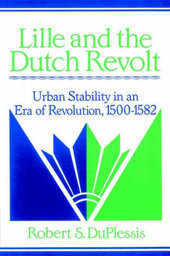
|
Lille and the Dutch Revolt: Urban Stability in an Era of Revolution, 1500-1582
Paperback / softback
Main Details
| Title |
Lille and the Dutch Revolt: Urban Stability in an Era of Revolution, 1500-1582
|
| Authors and Contributors |
By (author) Robert S. DuPlessis
|
| Series | Cambridge Studies in Early Modern History |
|---|
| Physical Properties |
| Format:Paperback / softback | | Pages:392 | | Dimensions(mm): Height 229,Width 152 |
|
| Category/Genre | World history - c 1500 to c 1750 |
|---|
| ISBN/Barcode |
9780521894173
|
| Classifications | Dewey:944.28028 |
|---|
| Audience | | Professional & Vocational | |
|---|
| Illustrations |
Worked examples or Exercises
|
|
Publishing Details |
| Publisher |
Cambridge University Press
|
| Imprint |
Cambridge University Press
|
| Publication Date |
9 May 2002 |
| Publication Country |
United Kingdom
|
Description
In the literature on the Dutch revolt--indeed, in the scholarship on revolution as a whole--the experience of the leading textile and trading center of Lille stands out as singular. Although affected by powerful economic, political, and religious currents that provoked rebellion in many other cities, it was renowned for adhering to the existing order. In this comprehensive study, Robert S. DuPlessis draws on a wide range of primary sources to illuminate the processes of selective adaptation that by the 1560s had endowed Lille with a structural tendency to stability.
Reviews"...this is a very significant study that enlightens many long-neglected aspects of the Dutch revolt by focusing on one locality, thereby not only clarifying the mechanism of maintaining stability in an age of revolution but shedding light on the process of revolution itself." Sixteenth Century Journal "Robert DuPlesses has written an important monograph that will undoubtedly be cited frequently in the future by scholars working on practically all aspects of the Hapsburg Netherlands in the sixteenth century." American Historical Review "DuPlessis' study makes exemplary use of historiography to establish the issues, of social theory to frame the questions and pursue their answers, and of comparative history to enhance the applicability of the results...his book is a major addition to the study of the Dutch Revolt and to the historical study of collective action." Jan de Vries, Journal of Interdisciplinary History
|